
Genmaicha Japanese Green Tea
Add Genmaicha to Kyusu and then add 50ml boiling water for every two grams of Genmaicha. Let it steep for around more than a minute. Pour the tea into small cups and enjoy. For a second infusion, brew it for 2 minutes with 90 degrees water. The brewed tea has a grassy and nutty aroma, yellowish color and sweet taste.
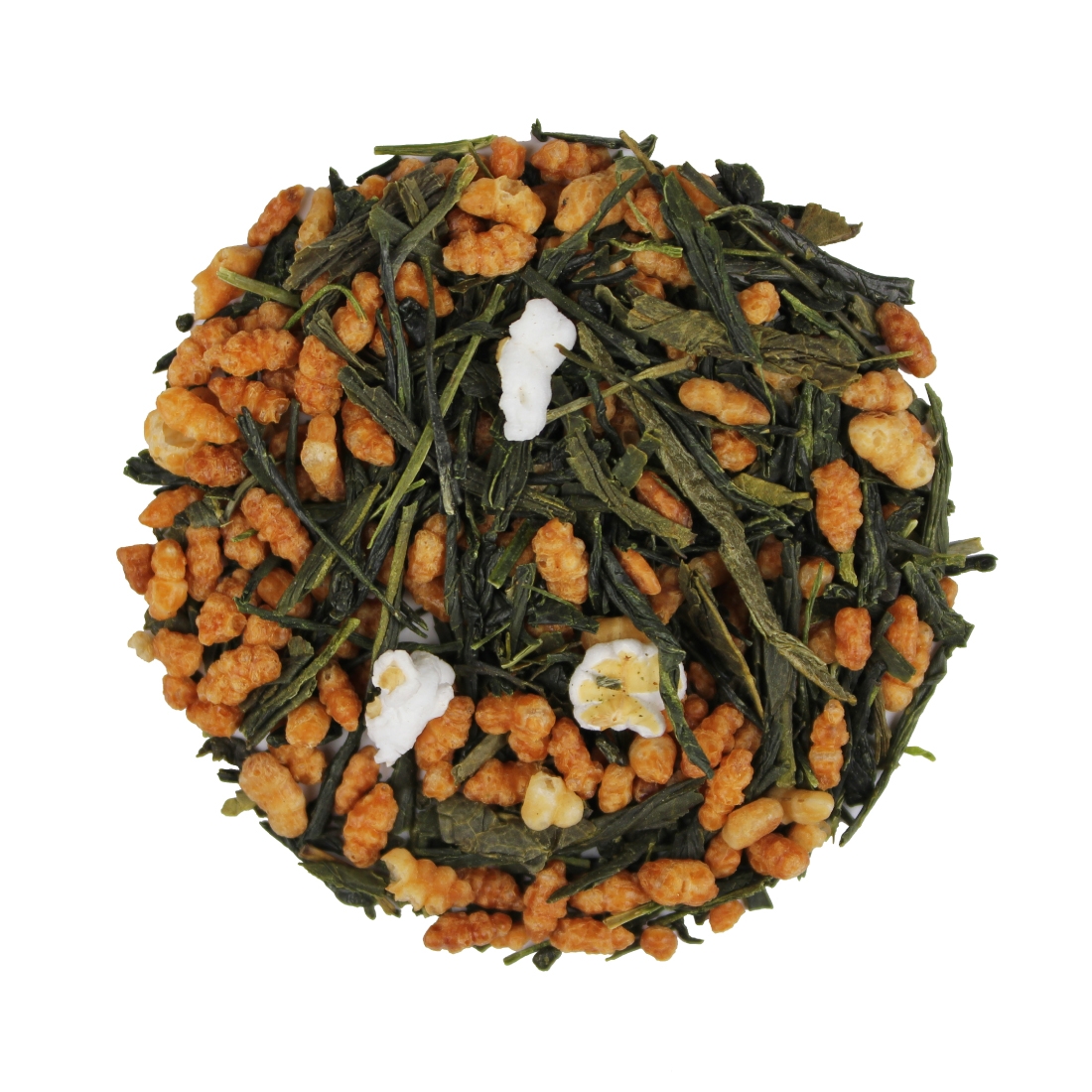
Genmaicha Tea Green Tea Loose Tea Tea Bags Murchie's Tea
Sugimoto Tea Company Genmaicha Teas. Genmaicha -- Made from our signature tea leaves that are deep-steamed to bring out a deep body and rich green hue to every brew and combined with roasted rice. Organic Genmaicha -- Our organic genmaicha tea has no popped rice kernels for maximum aroma. Genmaicha with Matcha -- Special blend of Genmaicha and.

Genmaicha Tea The Tea Centre Shop Japanese Green Tea
The history of Genmaicha green tea dates back to Japan's Edo period (1603-1868) when a Zen monk ingeniously added roasted brown rice to green tea to extend its shelf life. This innovative recipe has been passed down through generations, evolving with slight variations over time. Today, genmaicha is one of the most popular types of green tea in.

How to Make Genmaicha Tea in 5 Easy Steps Genmaicha tea, Matcha green
Genmai cha is a traditional Japanese tea that has a long and fascinating history.. Types of Japanese Green Tea. Genmaicha (brown rice tea) Genmaicha is a tea made by soaking and steaming rice in water, roasting it, and adding roughly the same amount of bancha or sencha to it. You can enjoy the aroma of roasted rice and the refreshing taste.

Genmaicha tea Food obsession, Genmaicha tea, My favorite food
Genmaicha is considered to be a low grade tea, along with bancha and houjicha. Hence the brewing method is to use high temperature when brewing (as opposed to high grade tea like gyokuro). Use 3 to 4 grams of genmaicha per cup and add to your kyusu (Japanese tea pot). The following video shows a type of kyusu called dobin (土瓶). Pour 120ml.
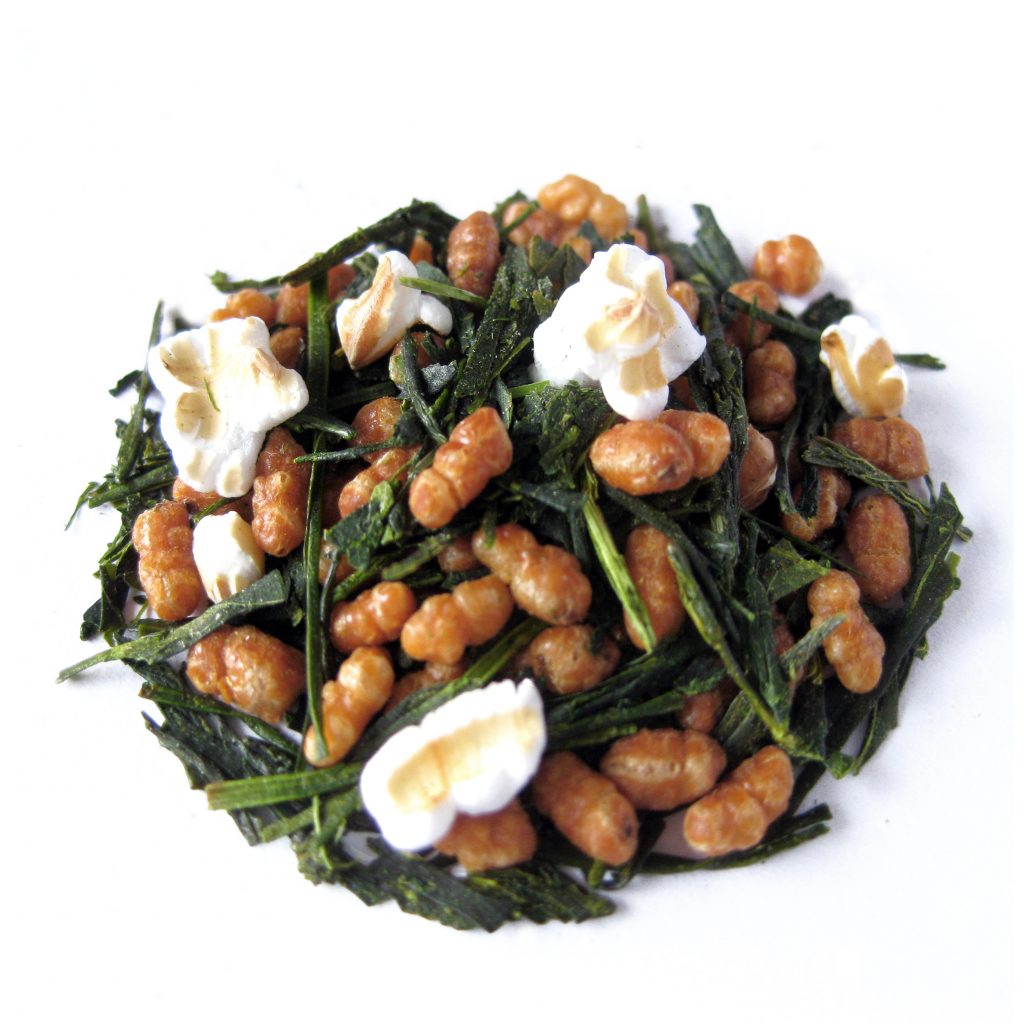
GENMAICHA
What is Genmaicha. Genmaicha is a mixture of toasted brown rice grains and green tea. It translates as "brown rice tea". The rice can be popped or just roasted, but this makes little difference in the flavor. It's sometimes called "popcorn" tea because of its nutty flavor and popcorn-like appearance on account of tiny popped brown rice kernels.

Genmaicha Japanese Green Tea Flying Cloud Tea
Genmaicha is a different kind of Japanese green tea that many people find intriguing. Brown rice kernels (genmai) are added while the green Bancha leaves (cha) are being dried, so the kernels get crispy and some burst open. Genmaicha has a unique appearance and a pleasant roasted flavor.

Genmaicha Japanese Green Tea with Organic Sencha and Roasted Rice
Genmaicha, also known as Japanese brown rice green tea, is a distinctive blend that marries the light, vegetal flavor of green tea with the nutty, savory notes of roasted brown rice. This unique combination has made Genmaicha a beloved beverage within and beyond Japan's borders. Definition of Genmaicha.
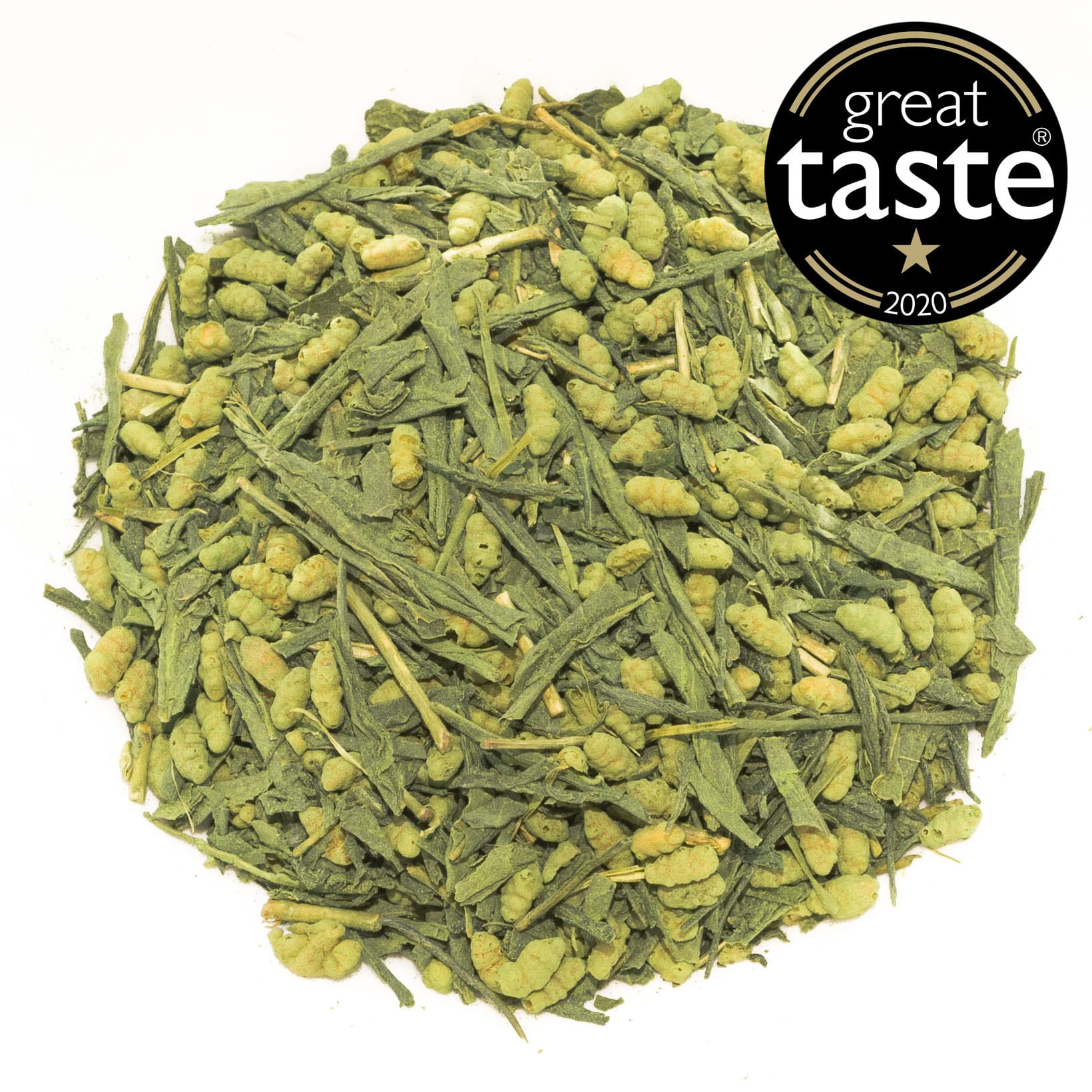
Matcha Genmaicha Japanese Green Tea Curious Tea
What is genmaicha? Genmaicha (Japanese 玄米茶, 'roasted rice tea'), is a Japanese drink made from green tea mixed with roasted brown rice. Because the rice sometimes 'pops' when it is being roasted, many people call it 'popcorn tea', or 'people's tea', since the rice serves to make the drink a bit more filling and reduce the overall price of the drink. This way even the poorest people in.
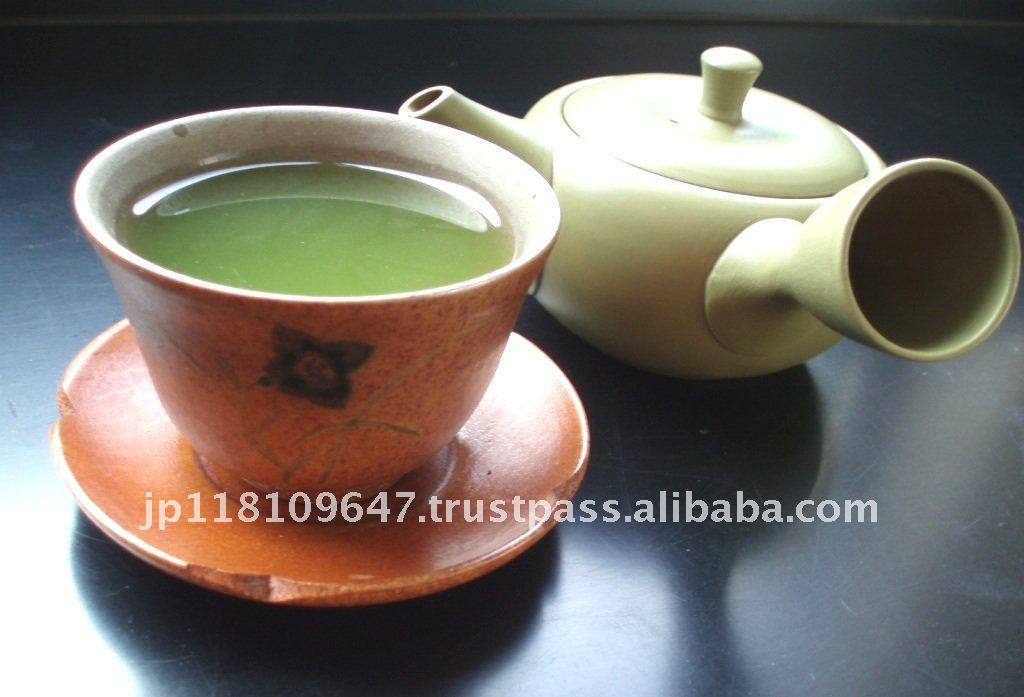
Japanese Green Tea Genmaicha with Matcha blend Tea Bag Made in Japan
Organic genmaicha tea is a treat for the taste buds. In a nutshell, Japanese Genmaicha is a green tea with roasted rice. While this may sound a little peculiar it is actually one of the freshest tasting green tea blends. The toasted rice adds a hint of mellow sweetness that makes this unique organic genmaicha loose leaf blend one to remember.

Genmaicha Green Tea Coffee BouTEAque
5. Genmaicha (玄米茶) This traditional Japanese green tea is an interesting mix of a Sencha tea blended with toasted puffed brown rice, It gives the tea a distinctively toasted grain undertone. It's a mild-flavored tea with an almost popcorn-like taste. An excellent choice for those who prefer low caffeine tea.

Genmaicha Yamasaki Green Tea This specialty Japanese style green tea is
Translating to "Brown rice tea", Genmaicha is a type of Japanese tea made up of green tea leaves mixed with roasted brown rice. Traditionally, Genmaicha was made with an affordable green tea known as Bancha; today, however, it is also made with Sencha or Gyokuro green tea leaves, which are more expensive and exclusive options.

Genmaicha Green Tea PekoeTea Edinburgh
Genmaicha (pronounced Gen-mai-cha) is a popular type of loose leaf Japanese green tea made from a blend of green tea, combined with roasted brown rice. It is known for having a light yellow hue, fresh grassy flavor and nutty roasted aroma and known as a comforting tea. Invented in 1930 in Kyoto, it is a relatively new tea in Japan.

Genmaicha Green Tea Sage Consulting & Apothecary
Fans in Japan often refer to genmaicha green tea as popcorn tea. This tasty and interesting beverage gets its nickname from the popping sounds that can be heard during the roasting process. Roasted rice gives this drink a hearty, satisfying quality. This beverage receives high reviews among tea lovers due to its buttery, sweet flavor.
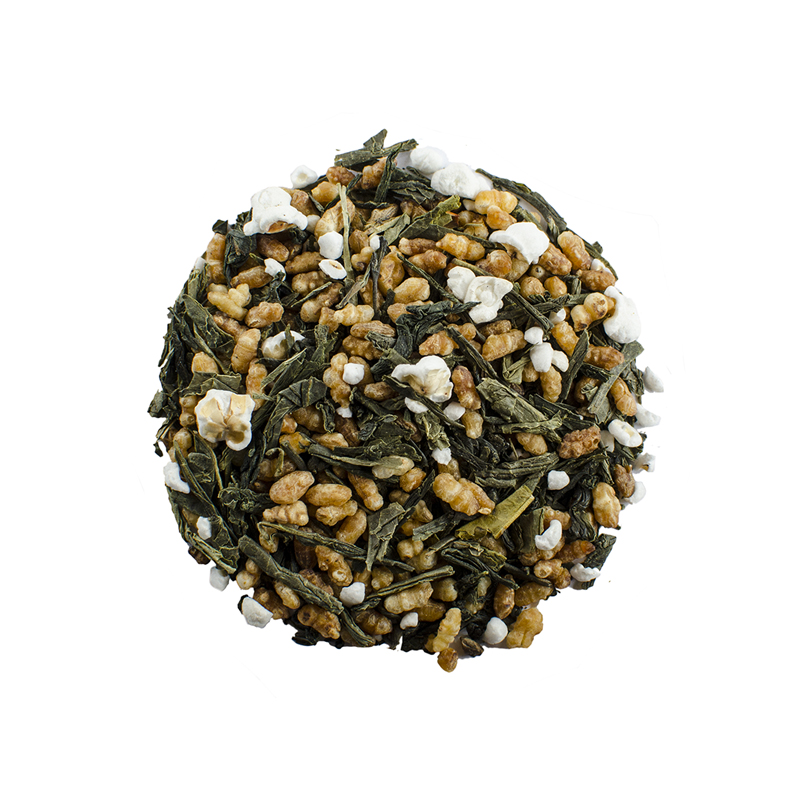
GREEN GENMAICHA ZenTea Retail
Genmaicha (玄米茶, "brown rice tea") is a Japanese brown rice green tea consisting of green tea mixed with roasted popped brown rice. It is sometimes referred to colloquially as "popcorn tea" because a few grains of the rice pop during the roasting process and resemble popcorn, or as "people's tea", as the rice served as a filler and reduced the price of the tea, making it historically more.

Japanese Green Tea Genmaicha Isolated on White. Tea Leaves with Stock
The history of green tea in Japan goes back to the 8th century when it was a popular stimulant for meditating monks. In this article, we examine tea's origins and cultivation, how it became an integral part of Japanese culture, the symbolism of the Japanese Tea Ceremony, and how one should drink tea according to traditional Japanese principles.. As the Japanese writer Kakuzo Okakura (1862-1913.